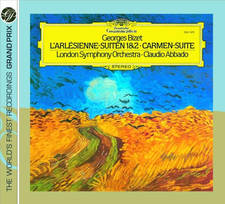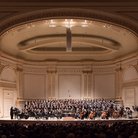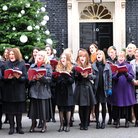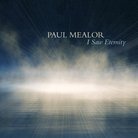Paul Mealor in Tim Lihoreau's Wednesday Web Chat
4 February 2013, 16:58 | Updated: 6 February 2013, 16:53
First cars, choral music, poetry, and films: Paul Mealor was the musical hot seat this week, chatting with More Music Breakfast presenter Tim Lihoreau from 9am on 6 February.
It seems wherever composer Paul Mealor goes, an unusual musical record is broken: his vocal work De Profundis contains the lowest note ever written in a composition. His song written for the Military Wives, Wherever You Are, was nominated for a BRIT Award before picking up a gong at the Classic BRITs - the first song to make such an impact in both the classical and pop fields. His motet Ubi Caritas was performed at the 2011 Royal Wedding between Catherine Middleton and Prince William, and was heard by 2.5 billion people - the largest audience in broadcasting history.
He joined More Music Breakfast presenter Tim Lihoreau to talk all things choral, and answered a wide range of questions from listeners in our weekly Wednesday Web Chat.
Tim Lihoreau: "MORK CALLING ORSEN....COME IN, ORSEN!" Or should I say...Tim calling composer Paul Mealor! Good Morning, Paul. Hope you are well. And many thanks for sparing us the time to 'web-chat'. First things first - are you there... and have you got coffee? Tim
I am here, thanks Tim. Thanks too for inviting me to join you on this freezing Aberdeen morning! I don't drink coffee, but a large cup of tea is on the desk. How are you?
Tim Lihoreau: I'm very well, too. Freezing Aberdeen sounds beautiful. In fact, that's a lovely cue for my first question. Do you have a special composing room? A view that you need, a la Mahler? Or does composing have to be... not exactly WORK but... a goodly amount per day, etc? Tim
Thanks Tim - it's a bit of both actually... I divide my time between here in Scotland and my place on Anglesey in North Wales. My place in Wales is right on the sea-front, so the view is amazingly inspirational and really helps composing... But I have a very strong work ethic and compose every morning for four hours, regardless of where I am. Though, I must say, being close to the Highlands is also a truly inspirational view from which to create music.
Kay Kelly: Will you be working with NYCoS again this year?
I would love to do that Kay - they are one of my favourite groups! Their performance of my Crucifixus last year was truly magical!
Floella De Vil Benjamin: I was just wondering, do you have an absolutely favourite text, religious or otherwise, that you would love to set to music? I can't wait to hear your answer online!
I certainly do: Yeats' The Wild Swans - it's amazingly perfect... In fact, so perfect that I'm not sure if I could 'add' anything to it with music... Check it out.
Floella De Vil Benjamin: Also, do you have a favoured type of cadence. And why?
Has to be the Neapolitan Sixth. I think because it's great in modulations and in voice leading... It's also very rich...
Phillip Cooke: I think your music has a very cinematic quality, would you ever consider writing a film score, and who would be your influences?
Thanks Phillip - that's a good question! I often compose music to powerful texts and try to 'paint, in sound' those words; so, composing a film score would certainly be something I would consider. In fact, I've been approached a few times to write one, but my schedule hasn't really allowed it. But, you never know... Maybe soon...
Tim Lihoreau: Paul, before we get onto more recent times, I'm intrigued to know about the path to where you are now. You must have been quite a young professor of composition at Aberdeen - was it... 2003? Was that aged 27? I tend to think of university profs as a little more like old Russian presidents. How did you get from college to... college, as it were?
I started teaching here at the Uni in 2003, yes; so, it was a very young appointment, I suppose... Though I do have the jacket with elbow patches! I was very lucky that, after my PhD at York University, they started the new department at Aberdeen and invited me to apply. So, I did and got the job - it's been fabulous building a department from nothing and now having over 200 students. One of the greatest things I've ever done.
Elaine James: Hi-di-hi Paul. I have 3 questions of which you don't have to answer all?
1. Do you like listening to jazz of any kind by way of a change, and if so what and who?
2. Can you play any of the big classics on piano, if not, would you like to get round to it in your old age (not that you're there yet! )
3. Is there a book on the horizon of your interesting life?
Hi Elaine - lovely to web-chat with you! Thanks too for being such a huge supporter of my music and of classical music in general! I LOVE jazz - especially the traditional kind. My favourite singer, without a doubt, is Nina Simone! I do play the piano, and often chill-out to Debussy or, another big favourite of mine, Mozart. His piano sonatas are much more demanding than they first appear. That, or a good book (just finished 'The Life of Pi' and loved it) are my chill-out favourites. Funny you should mention a book... Talked to someone last night who may well do just that!
Emma Wolfin Golding: What was your starting point for writing the choral piece for the Military Wives - what were your influences for that piece and also, who are your key musical influences?
Gareth Malone asked me to write something for his TV series. I wanted something that would help give these women a voice; so, we turned to their words and their hearts. The poem I then created out of those letters and feelings gave me all the inspiration I needed. Their lives are so full of joy and pain, and the music needed to bring hope. My major influences are the English composers, Vaughan Williams, Walton and Britten, the American, Morten Lauridsen (who is also one of my best friends), the Finn, Sibelius, and the great, Arvo Pärt. What I love about their music is its timeless quality and serenity.
Jo Forrest: Paul, do you sing yourself? I know York has a vibrant music scene. Were you involved in it at all?
Yes, I do sing. I'm a tenor; though, I didn't do a huge amount of singing at York - too busy with composing. But, one of my favourite things to do at York, when stressed-out was to attend evensong at the Minster - always a great way to hear fab singing and brilliant music. I sing here in Aberdeen though, as a lay-clerk at St Andrews Cathedral.
Matthew Berry: Morning Paul. How fast do you compose? Is it always a very fluid process? I imagine some texts lend themselves to musical settings better than others?
Yes, I do compose quickly. Working for four hours every day really gets one into a process of immediate, deep introspection. Once I have the idea, structure and direction of a piece, it comes to me, almost straight away... Some texts really do write themselves. For example, my setting of Now Sleeps the Crimson Petal is so linked to Tennyson's images that I can't read the poem now without hearing my notes.
Edward Armitage: I hear you're doing a major choral piece for performance in May. How's it going? Can you tell us a bit about it?
Yes, my new piece, 'The Farthest Shore' is for JAM and will be premiered at the St David's Festival in May. Great new text on an Anglesey folktale by the great poet and writer, Ben Kaye. I'm well on the way with it, I think it'll be something quite different from what people might expect from me... Some theatrical aspects and ghostly effects.
Sandra Debby Gracia-de Lima: Good morning Paul and Tim. The Netherlands calling. It must be so cool to hear an amazing ensemble such as Tenebrae perform your compositions, Paul. I think they're doing a wonderful job by capturing the spirit of your work... I enjoy it very much. Thank you, Paul.
Thank you Sandra. One of the greatest blessings in my life has been to get to know and work with the wonderful Tenebrae and the amazing, Nigel Short. Working with them is as easy as breathing - they now exactly what to do with my music and I never have to say a thing to them about interpretation, etc. Also, they're great champions of my work and perform it all over the world... Can't you tell? I LOVE them!
Liam Walsh: Good morning Paul, firstly thank you for your wonderful music and thank you especially for writing your Now Sleeps The Crimson Petal cycle, it was a huge inspiration to me when composing my final MA project last year. As a young/unknown composer, my main aim is to write more and get more work performed. What do you think is the best way to 'get your name out there'? I want to contact ensembles and choirs, and be seen as keen and enthusiastic, not annoying or pushy, which I can see there is a danger of.
Your question is an important one, and one many of us think about; however, my first suggestion to you is, at least initially, don't worry about 'getting known', just worry about writing the music you want to write and getting it to the best standard, both artistically and practically that you can. Then, send scores to conductors, organisations, enter competitions, attend summer schools. Once people see that you write well, they will engage with the music... Hope that helps? That's how we all started...
Tim Lihoreau: Paul, I will take this opportunity to wind up our Wednesday Web Chat. Molto thanks for getting to so many questions. One last one from me: on the lighter side. We've been discussing 'our first car' on the Breakfast programme today. Many great examples coming out from our listeners (John Suchet's was a gifted Austin A40, with dodgy indicators). Do you remember your first car? A car with character, by any chance? Best, and do pop in to Classic FM soon.
Thanks Tim - it's been really fun! Some great questions. Well, I can't beat John Suchet... My first car was a small, blue Ford Fiesta with 'go faster stripes'! It's only problem was that any key, to any Ford Focus could open it... So, quite often, people would accidentally drive off in it, only to bring it back realising it wasn't their car! I did love it though. It's been such fun, Tim. All best to you and all the fabulous people at Classic FM!






